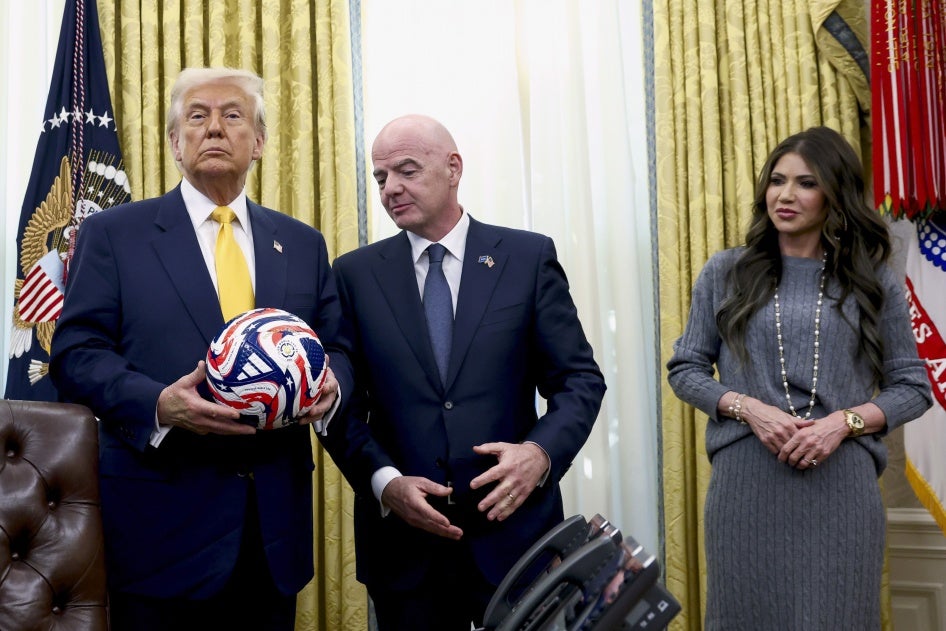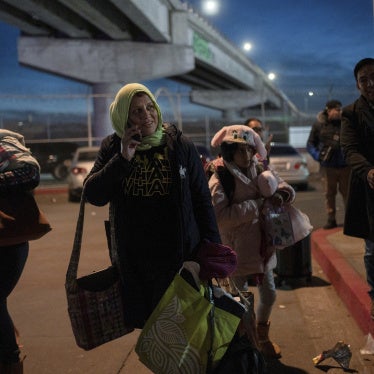The United States is preparing to host the 2026 FIFA soccer World Cup alongside Canada and Mexico. Meeting in March in the Oval Office with President Donald Trump, FIFA President Gianni Infantino said, "America will welcome the world. There will be millions of people coming, Mr. President, millions of people!" At a May 6 convening of the White House Task Force on the World Cup 2026, Vice President JD Vance announced, "Everyone is welcome to come and see this incredible event."
When these millions arrive to cheer one of 48 country teams, they may find themselves interrogated, detained, or even denied visas for their social media posts. Transgender people, including athletes, may be stigmatized by visa rules requiring them to declare their sex assigned at birth.
On June 4, the Trump administration issued an executive order barring entry for visitors from 12 countries, with severe barriers to entry for seven more nations. This proclamation is an escalation of Trump's discriminatory first-term travel ban that primarily targeted Muslim-majority countries. Although the order has carve-outs for World Cup athletes, any ban on visitors based solely on nationality contradicts the values of inclusion and global participation that the World Cup and FIFA claim to uphold.
The new travel ban bars entry for fans from countries including Iran, Afghanistan, Chad, the Republic of the Congo, Equatorial Guinea, Eritrea, Haiti, Iran, Libya, Myanmar, Somalia, Sudan, and Yemen, with severe restrictions on citizens of Burundi, Cuba, Laos, Sierra Leone, Togo, Turkmenistan, and Venezuela. Iran is already confirmed to play in the 2026 World Cup and tens of thousands of Iranian fans traveled to cheer its team for the last three World Cups. Meanwhile, The Athletic reports wait times for visa interviews at U.S. embassies for fans are as high as 700 days in Colombia, 560 days in Turkey, and 332 days in Morocco.
This World Cup was supposed to be the largest and most welcoming sporting event ever, the first to take place across three countries. The U.S. is slated to host matches in 11 cities and the closing tournament games.
When FIFA awarded the 2026 World Cup to the then-"United Bid" of the U.S., Canada, and Mexico, it heralded the tournament as one that would "unite and inspire people to create positive change through football." After anti-LGBTQ discrimination at Russia's 2018 World Cup and the catastrophe of Qatar's 2022 World Cup—where thousands of migrant workers died building infrastructure—FIFA promised greater accountability. The 2026 World Cup is also the first men's World Cup with a published Human Rights Strategy, advertised as raising the bar for sports events worldwide.
Since taking office, President Trump has issued executive orders overturning refugee rights and targeting vulnerable populations. New policies halt all student visa applications pending social media vetting. Tourist visa applicants must disclose social media account details and face heightened screening at border crossings, leading to denials of entry for ordinary travelers, conference participants, and teenage tourists. The administration has carried out detentions and visa revocations of international students, and wrongfully deported asylum seekers and legal U.S. residents to El Salvador, Panama, Costa Rica, and Rwanda. Even refugees vetted and cleared by the U.S. have been blocked from entry.
The chaos that unfolded in 2017 during Trump's first travel ban should serve as a warning. Families were separated at airports. Legal U.S. residents were detained. International students, workers, and visitors found themselves suddenly unwelcome.
So even with a visa to attend the World Cup, will players, fans, journalists, government officials, and families of athletes really want to be interrogated, detained, strip-searched, and possibly turned back at the U.S. border? Why risk thousands of dollars to be humiliated and possibly denied entry?
So far, FIFA hasn't criticized Trump's harmful immigration policies. Infantino's silence represents not just a business risk failure but also a betrayal of FIFA's own human rights principles. FIFA's statutes and human rights policy say that it will use its leverage to protect human rights "and positively contribute to their enjoyment," including through "constructive engagement with relevant authorities."
As the countdown to the 2026 World Cup advances, FIFA must do more than claim "the world is welcome in America"—when all the evidence is to the contrary.
Trump named himself chairman of the White House Task Force on the 2026 World Cup, so FIFA is in a good position to demand that the U.S. government ensure that all qualified teams, media, and fans will have equal access to the tournament regardless of nationality, religion, gender, or opinion. FIFA needs to press the Trump administration to roll back the pernicious visa policies and practices that threaten migrants and foreign visitors in the U.S.
Without such guarantees, FIFA needs to be prepared to reconsider its hosting decision. The beautiful game deserves better than to be played against a backdrop of ugly anti-human rights policies.










